- News
- Reviews
- Bikes
- Components
- Bar tape & grips
- Bottom brackets
- Brake & gear cables
- Brake & STI levers
- Brake pads & spares
- Brakes
- Cassettes & freewheels
- Chains
- Chainsets & chainrings
- Derailleurs - front
- Derailleurs - rear
- Forks
- Gear levers & shifters
- Groupsets
- Handlebars & extensions
- Headsets
- Hubs
- Inner tubes
- Pedals
- Quick releases & skewers
- Saddles
- Seatposts
- Stems
- Wheels
- Tyres
- Tubeless valves
- Accessories
- Accessories - misc
- Computer mounts
- Bags
- Bar ends
- Bike bags & cases
- Bottle cages
- Bottles
- Cameras
- Car racks
- Child seats
- Computers
- Glasses
- GPS units
- Helmets
- Lights - front
- Lights - rear
- Lights - sets
- Locks
- Mirrors
- Mudguards
- Racks
- Pumps & CO2 inflators
- Puncture kits
- Reflectives
- Smart watches
- Stands and racks
- Trailers
- Clothing
- Health, fitness and nutrition
- Tools and workshop
- Miscellaneous
- Buyers Guides
- Features
- Forum
- Recommends
- Podcast
feature
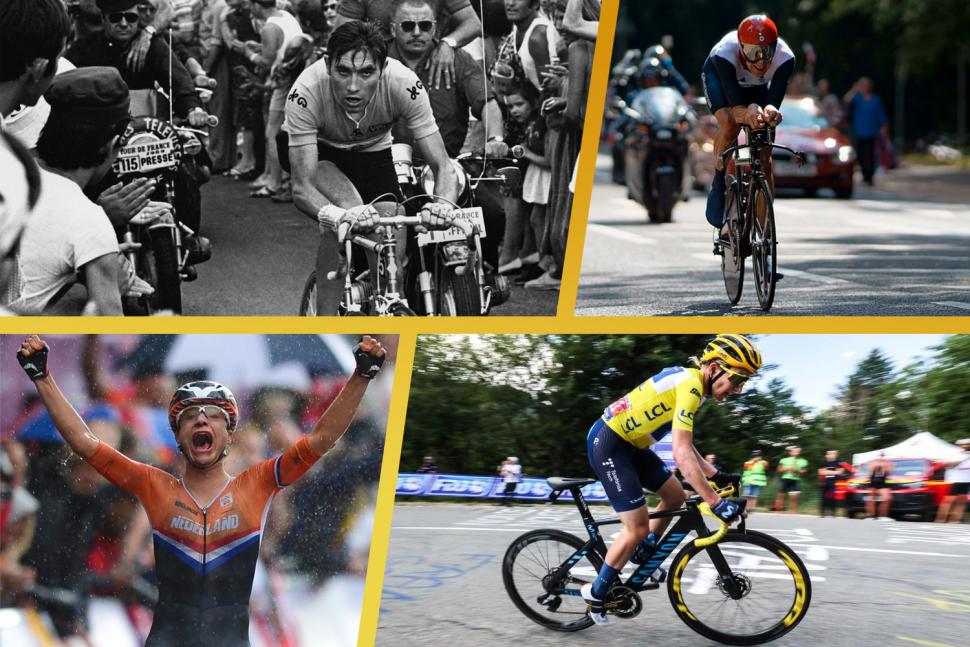 Cycling's greatest ever seasons
Cycling's greatest ever seasons From Coppi to Van Vleuten: Cycling’s greatest ever seasons
One Sunday afternoon in September, Annemiek van Vleuten stood in the dazzling sunshine of Madrid’s Plaza de Cibeles, clad in the Vuelta’s iconic red leader’s jersey, enjoying the adulation of the crowd after yet another dominant stage racing performance.
Standing on the top step of stage race podiums is something the Dutch star has become accustomed to over the past decade. She has, after all, won 14 GC titles, and amassed an astonishing 97 victories in total, during her storied 15-year career as a professional cyclist.
That sunny day in Spain’s capital, perhaps, may have meant a little more than many of those victories, even to the level-headed and pragmatic Van Vleuten. By clinching her second consecutive GC win at the Ceratizit Challenge by La Vuelta, the Movistar rider completed an unprecedented feat in professional cycling – in a single calendar year she has won each of the three traditional ‘major tours’ of Italy, France and Spain.
Unipublic/Lino Escuris
Of course, as women’s cycling continues to professionalise and its calendar continues to grow, there are some caveats to the Dutch rider’s unique success. The 2022 Tour de France Femmes, won by the then-39-year-old in spectacular fashion in July, was the first ‘proper’ edition of the French grand tour since her earliest days in the pro peloton.
Van Vleuten herself also admitted on her way to victory in Spain that “the Vuelta is not ready to call itself a grand tour yet” – though the Spanish race’s current rate of expansion (it has grown from a one-day circuit race in 2015 to a five-day event this year, with a week-long tour scheduled for next May) should soon provide it with the prestige and stature associated with its name.
Nevertheless, Van Vleuten’s remarkable success in those three races – and the dominant manner in which she won them – must go down as one of professional cycling’s greatest individual achievements.
And then, as if that particular cake needed any more icing, the Dutch superstar sealed her sensational 2022 by pulling off arguably the most stunning coup of the entire season to secure her second world road race championship against the odds.
Alex Whitehead/SWpix.com
Heavily bandaged and nursing a fractured elbow sustained just three days previously in a freak crash during the mixed relay event in Wollongong, Van Vleuten spent the majority of the women’s elite road race ostensibly working for Dutch teammate Marianne Vos, and unable to rise from her saddle on the course’s climbs due to what she later described as the “hellish” pain from her injury.
But, despite missing almost every key move during the race as she dangled off the back of the group of favourites, Van Vleuten entered the final kilometre right where she needed to be. One perfectly timed and expertly executed attack later and the 40-year-old – to the surprise of her rivals, spectators, and even herself – was world champion again.
Even by the Dutch superstar’s lofty standards, 2022 was a season to remember. Along with her world title and ‘grand tour triple’ in Italy, France and Spain, Van Vleuten’s palmares for this year also includes wins at Liège-Bastogne-Liège, Omloop Het Nieuwsblad, and the four-day Setmana Valenciana, as well as second places at Strade Bianche, the Tour of Flanders and La Flèche Wallonne.
And all of this after breaking her pelvis in two places during the inaugural Paris-Roubaix Femmes in October 2021.
From grand tour dominance and long-range attacks to gritty, last-ditch surprises, the Olympic time trial champion’s 2022 will certainly go down as one of the most successful and impressive seasons of all time.
A.S.O./Fabien Boukla
Van Vleuten’s seemingly constant habit of making history has sparked a long-running debate within road.cc HQ over the past few months: Which riders can lay claim to the greatest individual seasons of all time? And how do they compare with each other?
So, to settle that particular intra-office discussion, we decided to rank the top dozen greatest pro cycling seasons of all time, from Fausto Coppi’s heroic post-war exploits in the mountains of France and Italy to Marianne Vos’s merciless domination on all terrain (why 12, I hear you ask? Because I couldn’t decide on a top ten, that’s why).
To avoid the rankings being dominated by people called Eddy and Marianne, we decided to limit each rider to one stupendous season each.
Some famous names, naturally, are missing from the list, largely due to the fact that their biggest wins were evenly spread out over the course of their careers, rather than stuffed into one epic year (the Italian heroes Vincenzo Nibali and Gino Bartali arguably fall into this category) – making the longevity of some of those included all the more impressive.
BettiniPhoto
While others may have exerted dominance during specific parts of the season – think the spectacular springs of Fabian Cancellara in 2010, Tom Boonen in 2006 and 2012, and Lizzie Deignan in 2016 – most of the riders who made the list were on fire all year round, and won across a variety of different terrains, from the narrow lanes of the classics to the majestic mountains of the grand tours.
Before we get to the diamond dozen, honourable mentions must also go to Maître Jacques Anquetil’s stage-race decimating 1963 season, Philippe Gilbert’s Ardennes domination of 2011, and Mark Cavendish’s 2009 season, as well as Nicole Cooke (2006), Greg Van Avermaet (2016), and Freddy Maertens (1977).
So, without further ado, here is road.cc’s ‘definitive’ list of the 12 greatest cycling seasons of all time:
12. Beryl Burton, 1967
Highlights: World championship road race, British national road race, British 12-hour time trial record, British Best All-Rounder (male and female)
Dutch National Archives
Like many of the riders who feature on this list, British trailblazer Beryl Burton is perhaps best known for her outstanding longevity, to the extent that the 13-time national road race champion and 25-time Best All-Rounder was competing against her own daughter Denise as she entered her fifth decade, and won her final time trial titles at 49.
It’s certainly a crowded field but 1967 was arguably Burton’s best – and most iconic – year. The Leeds woman took her second (and final) rainbow jersey in Limburg to add to her seventh British road race title, collected two months before.
Most famously, she set a staggering new 12-hour time trial record of 277.25 miles, passing Mike McNamara – who was on his own way to setting the men’s record, 0.73 miles shy of Burton’s – on the way, reputedly handing him a liquorice allsort as she sped by.
Who knows what Beryl could have achieved with today’s calendar and the increasing professionalisation of women’s cycling?
11. Bradley Wiggins, 2012
Highlights: Tour de France (GC and two stages), Olympic Games time trial, Paris-Nice (GC and one stage), Critérium du Dauphiné, Tour de Romandie
Cometh the hour, cometh the Mod. After two frustrating years plagued by bad form and poorly timed crashes, everything finally went right in 2012 for the kid from Kilburn, as he made good on Dave Brailsford’s commitment when he set up Team Sky to deliver a British Tour winner within five years.
Wiggins was peerless in 2012, winning every single major stage race rendezvous on the way to July, including emulating his hero Tom Simpson with overall victory at Paris-Nice, establishing a template – dominate in the TT, defend your lead in the mountains – that served him well on the roads of France (though it wasn’t all robotic and pre-programmed: remember that out-of-nowhere bunch sprint win in Romandie).
By the time the soon-to-be Sir Wiggo drew the raffle numbers in Paris, the sideburn-sporting 32-year-old had captured an Olympic fever-gripped nation’s imagination, and fittingly capped it all off with his fourth gold medal (of a career total of five) at Hampton Court Palace.
His teammate-cum-rival Chris Froome enjoyed similarly dominant seasons after 2012 but, as one journalist put it in the mid-2010s, it all felt at the time – rather unfairly, in retrospect – a bit ‘after the Lord Mayor’s show’ of 2012.
10. Anna van der Breggen, 2018
Highlights: World Championships road race, Strade Bianche, Tour of Flanders, Flèche Wallonne, Liège-Bastogne-Liège, Durango-Durango
Alex Broadway/SWpix.com
It’s rather unfortunate that the enduring image associated with Anna van der Breggen’s sensational 2018 season is that of her compatriot Annemiek van Vleuten bearing down on her on that final agonising ramp to the finish in Le Grand-Bornand.
That year’s mountainous edition of La Course by Le Tour de France perfectly encapsulated the era-defining rivalry between Van der Breggen and Van Vleuten, toe-to-toe, fighting for every inch, miles ahead of the rest. But it does a lousy job of conveying Van der Breggen’s dominance in one-day racing that year.
She may have won the Giro Donne on four occasions during her illustrious career, but 2018 was the apex of AVDB, the classics contender. She won five of the most important one-day races on the women’s calendar (including her by then obligatory triumph on Flèche’s Mur de Huy) and capped it all off with a devastating 40km solo ride to take her first rainbow jersey.
On a tough, hilly course in Innsbruck, a ruthless Van der Breggen finished a whopping 3:42 ahead of second-place Amanda Spratt – and over seven minutes clear of Van Vleuten.
9. Tadej Pogačar, 2021
Highlights: Tour de France (GC and three stages), Liège-Bastogne-Liège, Il Lombardia, Tirreno-Adriatico (GC and one stage), UAE Tour (GC and one stage), Tour of Slovenia (GC and one stage), Olympic Games road race (bronze medal)
ASO/Charly Lopez
After his smash and grab Tour de France victory on La Planche des Belles Filles in 2020, the Slovenian boy king laid to rest any lingering doubts over his status as cycling’s Next Big Thing™ with one of the most relentlessly dominant seasons in recent times.
By taking Liège-Bastogne-Liège and Il Lombardia along with a second yellow jersey, Pogačar (still only 22 for most of 2021, remember) became the first rider since Merckx to triumph in a grand tour and two monument classics in a single year.
It wasn’t just the numbers that were Merckxian – his crushing of the Tour peloton on the road to Le Grand-Bornand, and his suffocation of the race thereafter, displayed the kind of cannibalistic tendencies that led many to believe we were entering a new era of unrelenting dominance.
It hasn’t quite worked out that way, but judging by his performance in Montréal last week there’s no betting against Pogačar restamping his authority on the peloton over the next 12 months.
8. Jeannie Longo, 1987
Highlights: Tour de France Féminin (GC and four stages), World Championship road race, French national road race, Postgiro Féminin (GC and four stages), Coors Classic (GC and four stages)
Able to count Maria Canins and Marianne Vos among her rivals, Frenchwoman Jeannie Longo is another pioneering female rider famed for her longevity and astounding palmares.
1987 – when Longo was only 28 with another quarter of a century still left in the bank – reads like a career highlight reel. Four stage wins and the first of three consecutive overall victories at the Tour de France Féminin (finally deposing two-time champion Canins) were backed up by GC successes at the Norwegian Postgiro Féminin and the prestigious Coors Classic. Oh, and the third of her five career world road race championships and the ninth of 20 – yes, 20 – French national titles.
Of course, this being Longo, 1987 wasn’t without its controversy. After winning the Coors Classic, along with four stages, she tested positive for ephedrine following a 3km world record attempt in Colorado Springs, and promptly served a month-long ban. There’s no such thing as the perfect year, especially in cycling.
7. Bernard Hinault, 1979
Highlights: Tour de France (GC and seven stages), Tour of Lombardy, Flèche Wallonne, Dauphiné Libéré (GC and four stages), GP des Nations
Le Coq Sportif
Bernard Hinault’s character is often distilled into certain fleeting, iconic moments: the escape from a ravine at the 1977 Dauphiné, the flying fist towards the striking shipyard workers at Paris-Nice, the Badger’s bloodied face in Saint-Étienne at the ’85 Tour.
But nothing, perhaps, sums up the five-time yellow jersey winner’s relentless drive as much as his shock stage win in Paris at the end of the 1979 edition of the Grande Boucle.
The then-24-year-old Breton was at the height of his powers following his maiden Tour triumph the year before. He had completely dominated the 1979 race, and by the final stage into Paris had secured an unassailable three-minute advantage over Joop Zoetemelk (who would win the following year’s Tour after Hinault’s tendonitis-related abandon while in the yellow jersey).
The final stage on the Champs-Élysées was, then as it is now, the traditional playground of the sprinters. And, in any case, the race was a bygone conclusion. So, what did Hinault do? Well, he simply decided to rip up the script and shove it in the faces of the fast men, by attacking with Zoetemelk over the cobbles and storming to yet another stage victory.
In his book Étape, the late Richard Moore writes: ‘To win there, in the yellow jersey, showed more than strength and speed. It showed panache and defiance. It was a two-fingered salute.’
As Moore acknowledged, Hinault had already won the Tour, along with six stages. Taking a seventh, in yellow, on the Champs-Élysées no less, was ‘completely unnecessary’.
But it was also peak Hinault.
6. Sean Kelly, 1984
Highlights: Paris-Roubaix, Liège-Bastogne-Liège, Paris-Nice (GC and two stages), Critérium International (GC and three stages), Tour of the Basque Country (GC and three stages), Volta a Catalunya (GC and four stages), Blois-Chaville (Paris-Tours), Paris-Bourges, GP Plouay, Tour du Nord-Ouest, Tour de France (5th overall), Tour de Suisse (one stage and 4th overall), Milan-Sanremo (2nd), Tour of Flanders (2nd), Super Prestige Pernod
In the spring of 1984, a new king was crowned. Well, that’s what the Irish press were saying, anyway, when a farmer’s son from Carrick-on-Suir rose to the top of professional cycling’s aristocracy with one of the most consistently successful and varied seasons of all time.
Kelly’s wins at Paris-Roubaix and Liège – arguably the extreme ends of the monument spectrum – made him only the third (and last) man in history to achieve that particular double, after Merckx and ‘the Emperor’ Rik Van Looy.
His raft of wins at some of the biggest one-week stage races (including Paris-Nice, the Irishman’s own personal fiefdom in the 1980s), along with his fifth place overall at the Tour, also underlined the kind of versatility and year-long dominance that would make Wout van Aert blush.
There were near misses too: second places at two other monuments (Milan-Sanremo and Flanders, the one that always eluded him) were followed by agonisingly losing the green jersey on the very last day of the Tour de France to Frank Hoste.
Perhaps the most impressive part of Kelly’s spring of 1984 – which he described in his autobiography as “the peak of my career” – was his ability to excel in the midst of a gruelling, sponsor-mandated schedule. In the two weeks between his runners-up spot in Flanders and his win in Liège, he raced ten times, in three different countries – and only finished outside of the top two twice.
A positive drugs test for Stimul at Paris-Brussels in the autumn, resulting in disqualification and a suspended one-month ban, put a slight dampener on things (Kelly blamed the affair on a shoddy test, soigneur Willy Voet alluded to a mechanic’s doped-up urine, the case dragged on until 1986).
Not that you would know listening to Kelly himself, of course. Even kings can be subject to cycling’s law of silence.
5. Stephen Roche, 1987
Highlights: Tour de France (GC and one stage), Giro d’Italia (GC and two stages), World Championship road race, Tour de Romandie (GC and two stages), Volta a la Comunitat Valenciana (GC and one stage), Super Prestige Pernod
‘That looks like Stephen Roche. It’s Stephen Roche!’
After bursting onto the pro scene with victory at the 1981 Paris-Nice, the smooth-pedalling Irishman took six years to finally pay off on all of that early promise – and then some – by becoming only the second rider in history (behind You Know Who) to achieve what many regard as cycling’s greatest and most difficult feat: the ‘triple crown’ of the Giro d’Italia, Tour de France, and world road race championships, all in one stunning season.
Roche’s triple crown wasn’t without its drama: his Giro win was dominated by a bitter internecine rivalry with Carrera teammate and defending champion Roberto Visentini, while the Tour witnessed an epic duel with Pedro Delgado, epitomised by that iconic day on La Plagne.
In Villach, Austria, in early September, with the Irish team united behind Sean Kelly’s bid to finally win the rainbow jersey, it was the man of the year Roche who instead stole the show, and with it his place in cycling history.
And it could have been even better. In April, the Dundrum rider threw away a golden opportunity at Liège-Bastogne-Liège, where a prolonged, naïve game of cat-and-mouse with Claude Criquielion allowed Moreno Argentin to flash by for the Italian’s third consecutive win at La Doyenne.
Roche castigated himself after the race, saying he “rode like an amateur”. He certainly more than made up for that disappointment later in the year.
4. Fausto Coppi, 1949
Highlights: Tour de France (GC and three stages), Giro d’Italia (GC and three stages), Milan-Sanremo, Tour of Lombardy, Italian road race championships, Giro di Romagna, Giro del Veneto
According to the late Eurosport commentator David Duffield, Fausto Coppi is the greatest cyclist to have ever raced a bike. And who am I to argue with someone in a straw hat?
Il Campionissimo, the champion of champions, was pure class and elegance on two wheels, a rider prone to the epic and unimaginable, and a complicated man who had a lasting influence on Italian sport and society in general.
In 1949, Coppi had a point to prove. The year before, his great rival Gino Bartali had won the Tour de France (“saving the republic”, as the story goes), while the ‘third man’ of Italian cycling, Fiorenzo Magni, had nabbed the Giro.
He promptly started the season in electric form, winning for the third time in Sanremo before engineering victory for his brother Serse at Paris-Roubaix.
At the Giro, where Italy’s cycling obsession had reached fever pitch, Coppi produced one of the sport’s most iconic moments: attacking with 192km left of the epic 254km stage between Cuneo and Pinerolo, over five cold and rainy Alpine passes, to distance Bartali by twelve minutes and secure the pink jersey.
In France, Coppi overcame a 37-minute deficit to French rider Jacques Marinelli – not helped by an almost race-ending crash on stage five – to become the first rider to achieve the Giro-Tour double, again besting Bartali in the process (this time by only 11 minutes compared to the Giro’s whopping 24-minute gap).
Before the race, the ever-fragile Coppi told a teammate that he would quit the sport if he didn’t win the 1949 Tour – he made history instead.
3. Annemiek van Vleuten, 2022
Highlights: Giro d’Italia Donne (GC and two stages), Tour de France Femmes (GC and two stages), Ceratizit Challenge by La Vuelta (GC and one stage), Liège-Bastogne-Liège, Omloop Het Nieuwsblad, Setmana Valenciana (GC and one stage), Strade Bianche (2nd), Tour of Flanders (2nd), La Flèche Wallonne (2nd), Tour de Romandie (2nd)
Alex Whitehead/SWpix.com
On paper, Annemiek van Vleuten’s ground-breaking achievements are impressive. What makes her the rider she is, however, is that on the road they’re even better.
AVV is a sucker, after all, for the long heroic solo breakaway. The template she constructed on the twisty roads of Yorkshire in 2019 was arguably perfected in the Vosges this July.
After appearing sluggish during the opening stages of the Tour de France Femmes, thanks to stomach issues which left her unable to eat and devoid of energy, Van Vleuten decimated the field on the road to Le Markstein, attacking closest rival Demi Vollering 62km from the finish to effectively wrap up a historic yellow jersey.
Like so many on this list, when Van Vleuten wins, she dominates. And even when she doesn’t dominate – like at this year’s worlds in Wollongong – she still finds a way to win. Unbeatable.
2. Eddy Merckx, 1972
Highlights: Tour de France (GC and five stages), Giro d’Italia (GC and four stages), Milan-Sanremo, Liège-Bastogne-Liège, Tour of Lombardy, Flèche Wallonne, Paris-Nice (three stage wins), Brabantse Pijl, Scheldeprijs, Gran Piemonte, Giro dell’Emilia, Trofeo Baracchi (with Roger Swerts), A Travers Lausanne, World Hour Record
It’s not an overstatement to say that the vast majority of Eddy Merckx’s professional seasons would be enough for any other cyclist, over the entire course of their career, to gain entry into the sport’s hall of fame.
But nothing quite sums up the Belgian legend’s phenomenal 1972 season – undoubtedly the greatest ever seen by the men’s peloton – along with Merckx’s insatiable, “cannibalistic” mindset, as much as the way it finished.
By October’s season-ending Putte-Kapellen, Merckx had won a mind-boggling 50 times on the road, including a Giro-Tour double and three monuments. He finished on the podium in 57 percent of the races he entered. In the seventeen races he entered following his fourth straight Tour win, the Belgian only finished outside of the top four once, and outside of the top two a further two times.
Nevertheless, despite (or perhaps because of) that almost unimaginable level of success, at the Putte-Kapellen Merckx threw his bike to the ground in disgust after being beaten into second by Gustaaf Van Roosbroeck.
A week later, he travelled to Mexico City for the biggest gamble of his career and to take on the one adversary he hadn’t yet beaten: himself. Merckx capped off his career-defining 1972 season by smashing Ole Ritter’s Hour Record (and his 10km and 20km distance records along the way) by 788 metres, the biggest jump the record had seen since 1912. Insatiable.
1. Marianne Vos, 2012
Highlights: Olympic Games road race, World road race championships, World cyclocross championships, Giro d’Italia Donne (GC and five stages), Trofeo Alfredo Binda, Ronde van Drenthe, Novilon Eurocup, Classic Lorient Agglomération, Festival Elsy Jacobs (GC and two stages), Tour Féminin en Limousin (GC and two stages), Simac Ladies Tour (GC and two stages), UCI World Cup
Alex Broadway/SWPix.com
Just like Merckx – the only true rival to her position as the Greatest Cyclist Of All Time – most riders would only dream of achieving in their entire careers what Marianne Vos accomplished in 2012, the finest year in professional cycling’s history.
The headlines speak for themselves: an era-defining Olympic gold in the rain on the Mall, ahead of Lizzie Deignan, a redemptive second world championship road race triumph after five years of frustrating runner-up spots, and a second straight overall win (complete with points jersey) at women’s cycling’s biggest stage race, the Giro Donne.
But it’s the breadth and depth of the Dutch rider’s success a decade ago, so indicative of her entire career, that really make her 2012 season stand out. Of the 43 days she raced on the road, she won 16 of them, never finishing outside of the top 25 and only failing to make the podium on six occasions.
Known primarily as a classics rider and stage hunter early in her career – a specialism she has reverted to, to stunning effect, in recent years – this was the year Vos perfected her stage racing craft. Of the five multi-day events she entered, the Bloeizone Fryslan – where she finished third overall – was the only one to elude her.
Despite missing three of the nine events, Vos’s consistency netted her the UCI World Cup title, while her unprecedented range of ability was underlined in the opening weeks of the year by securing her fifth cyclocross world title.
And all of this with a massive target on her back stemming from being by this point firmly established as the finest rider of her, or any, generation.
As women’s cycling continues to expand and professionalise, reaching new audiences and inspiring new waves of talent, Vos – and her never-to-be-repeated 2012 season – remain the benchmark and catalyst for that growth and success.
Do you agree with our list of cycling’s greatest seasons? Have we missed anyone out, or do you reckon your favourite should be placed higher? Let us know in the comments!
After obtaining a PhD, lecturing, and hosting a history podcast at Queen’s University Belfast, Ryan joined road.cc in December 2021 and since then has kept the site’s readers and listeners informed and enthralled (well at least occasionally) on news, the live blog, and the road.cc Podcast. After boarding a wrong bus at the world championships and ruining a good pair of jeans at the cyclocross, he now serves as road.cc’s senior news writer. Before his foray into cycling journalism, he wallowed in the equally pitiless world of academia, where he wrote a book about Victorian politics and droned on about cycling and bikes to classes of bored students (while taking every chance he could get to talk about cycling in print or on the radio). He can be found riding his bike very slowly around the narrow, scenic country lanes of Co. Down.
Latest Comments
- C3a 2 sec ago
Apart from any incarceration or fines, in my view driving bans need to be more routinely administered....
- David9694 34 min ago
Southampton: Car smashes into shop on St Catherines Road...
- Mr Blackbird 37 min 37 sec ago
How about this for negative stereotyping :...
- whosatthewheel 52 min 23 sec ago
Sadly same experience here with TPT local to me. It has recently been modernised (widened, with dirt replaced with asphalt) to create an off-road...
- David9694 41 min 22 sec ago
£1500? I almost feel the layer of grime lifting off this one with my Muc-off cleaner, a shine returning to the alu with Autosol and an old t-shirt:...
- slc 3 hours 14 min ago
Madness, isn't it? ...
- Basemetal 4 hours 1 min ago
Watch out for toe overlap (front wheel clearance) with midfoot cleats,
- Safety 5 hours 14 min ago
"So now you're saying that being in that family - even by marriage - makes you more likely to commit a traffic offence?"...
- neilwheel 6 hours 9 min ago
Will those wide rim brake models fit inside a shimano 40-49mm brake caliper with 28mm max clearance??? Gonna be a squeeze...
- Simon E 6 hours 18 min ago
I'd be even more concerned about the effect it may have on whether the helmet can still do its job in the event of an impact....
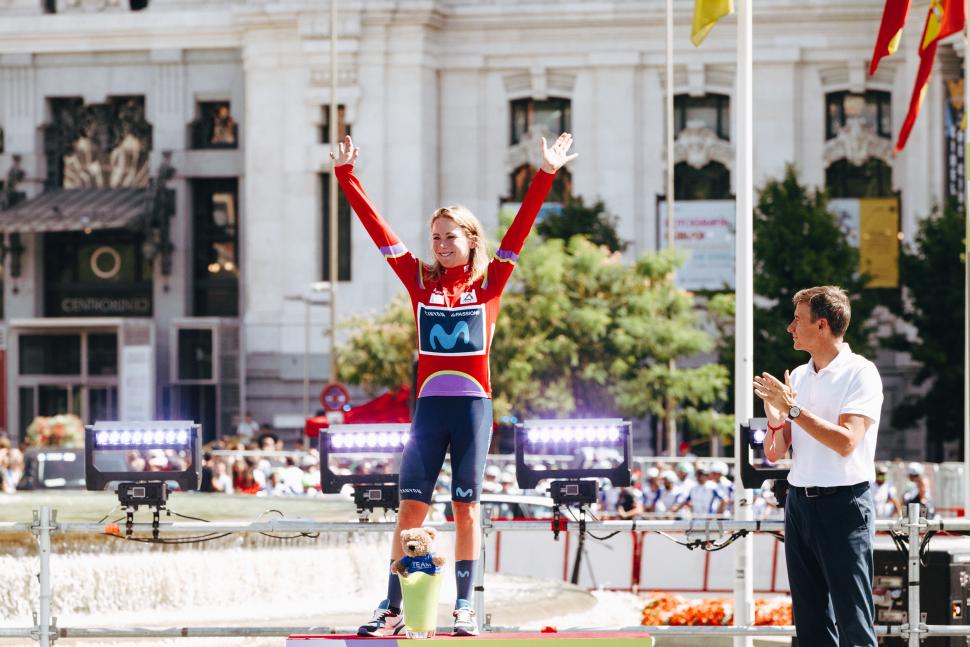
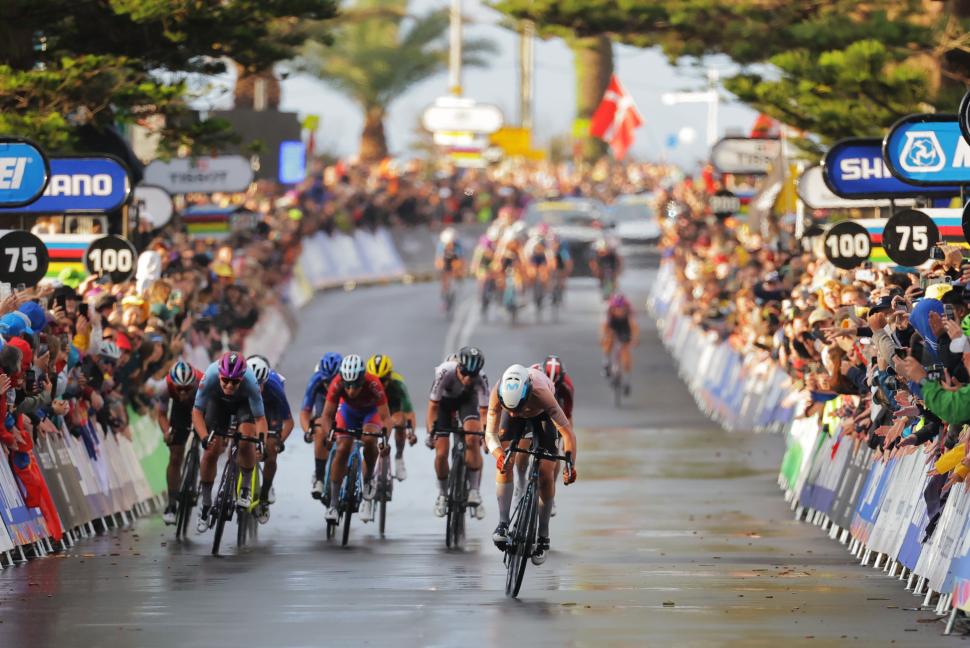
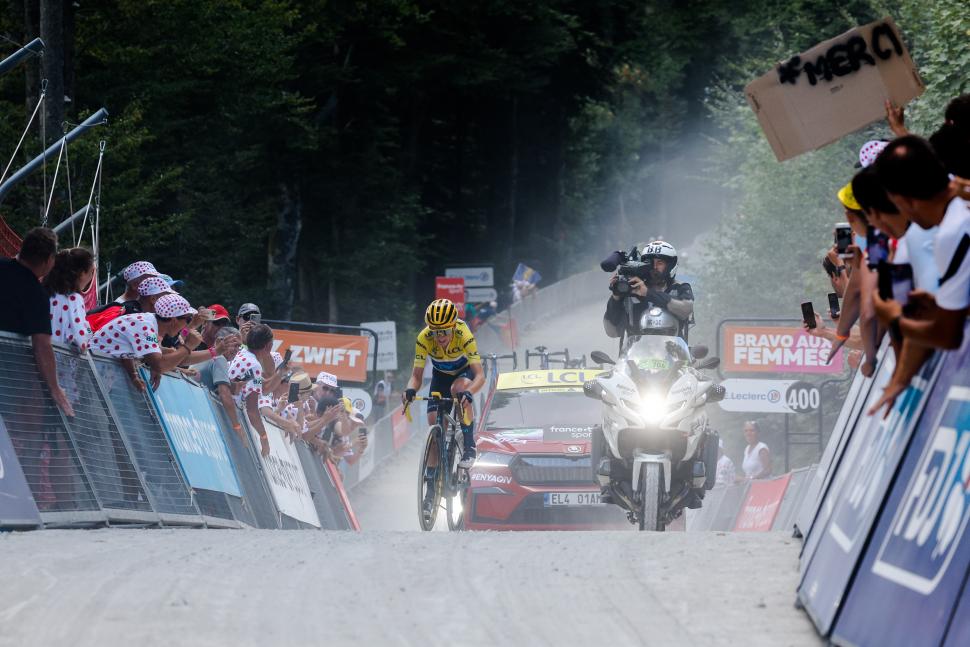
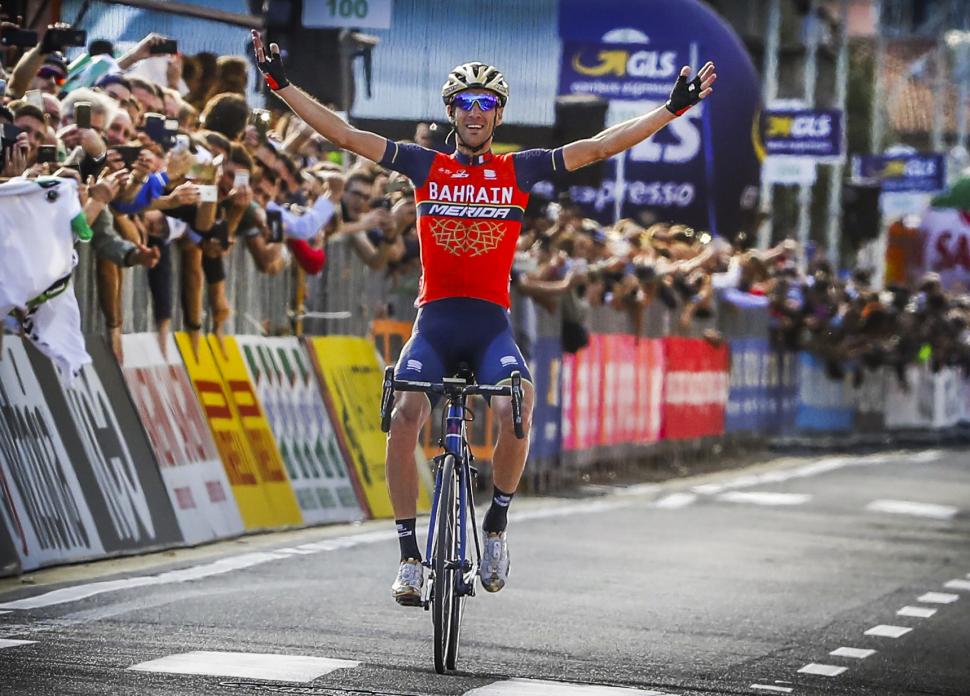
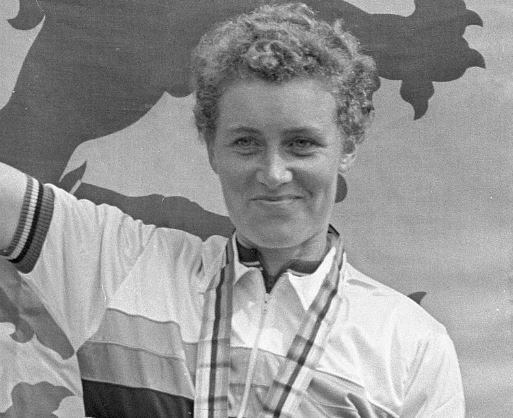
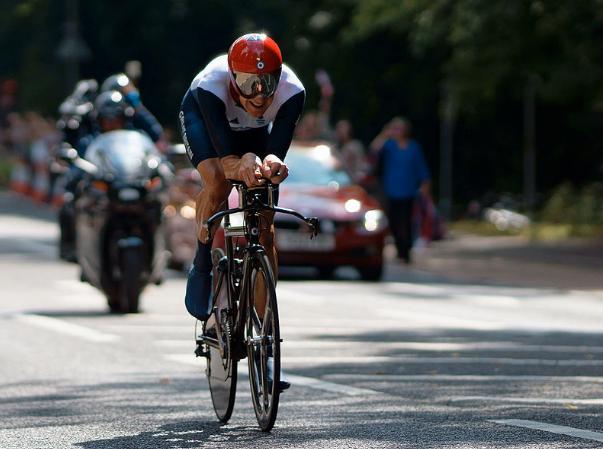
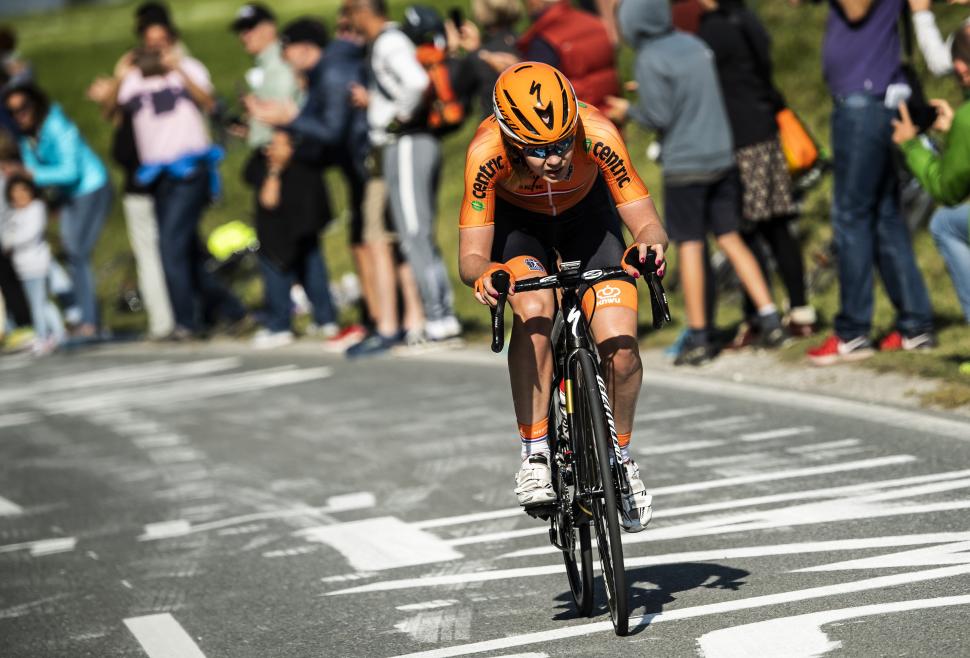
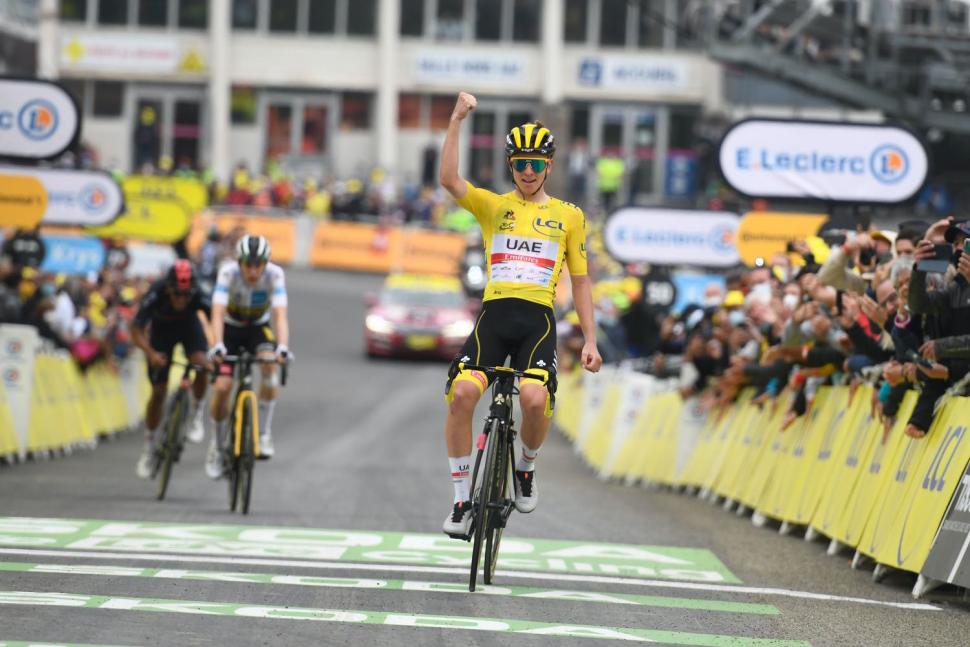
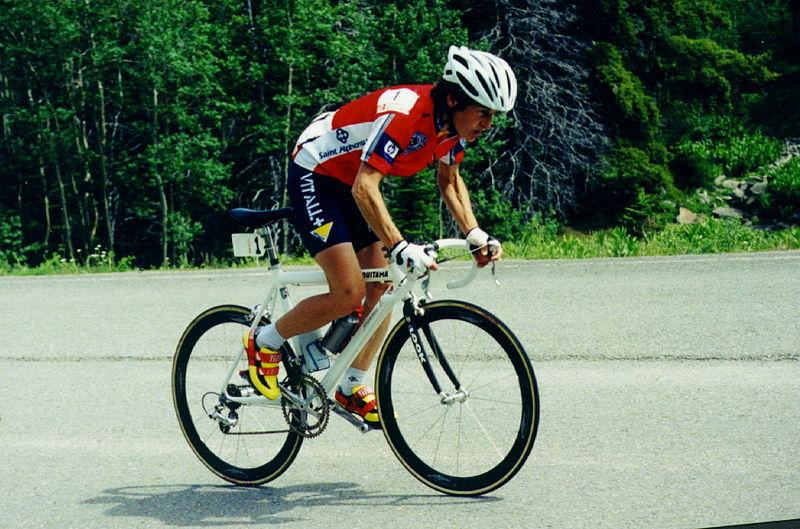
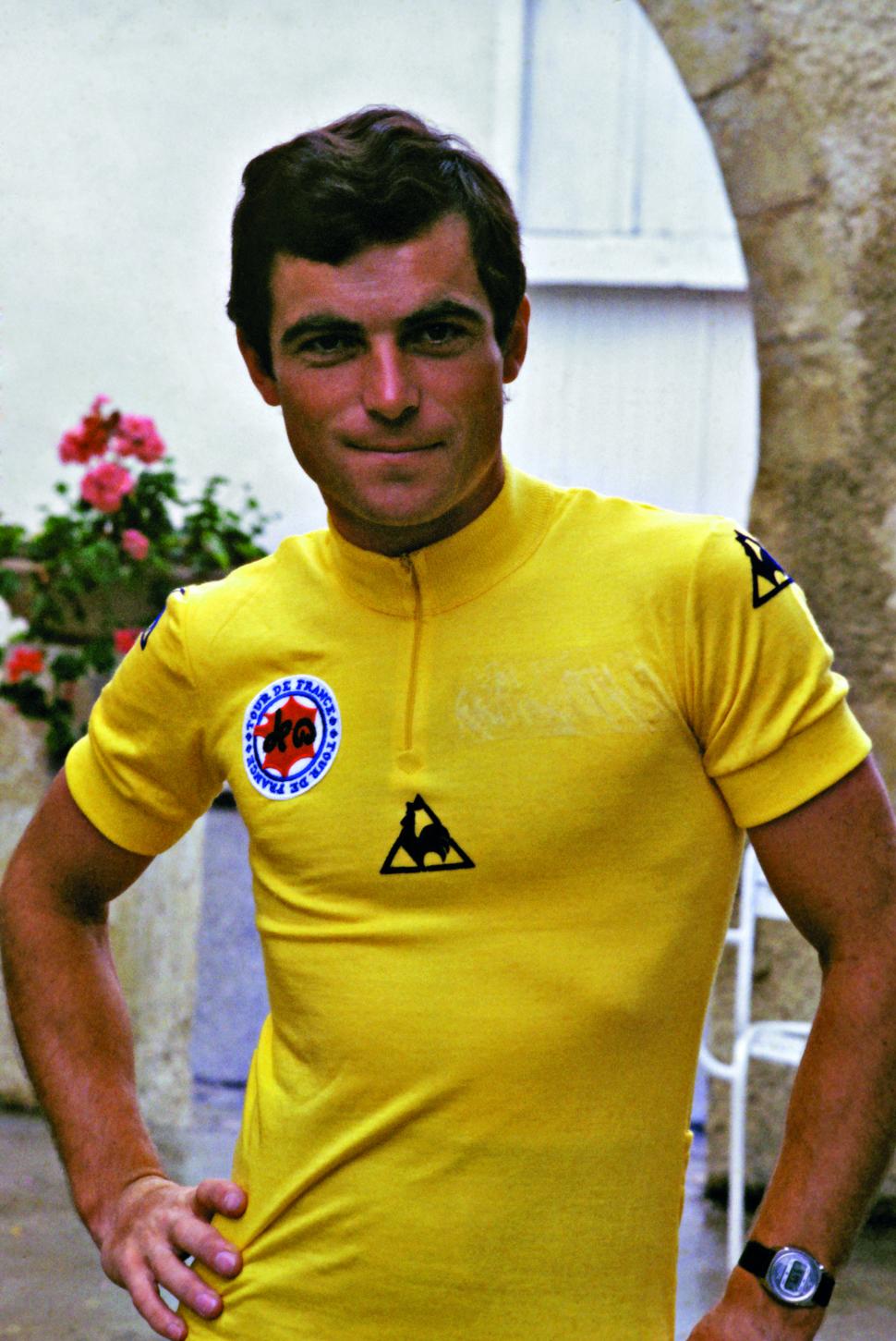
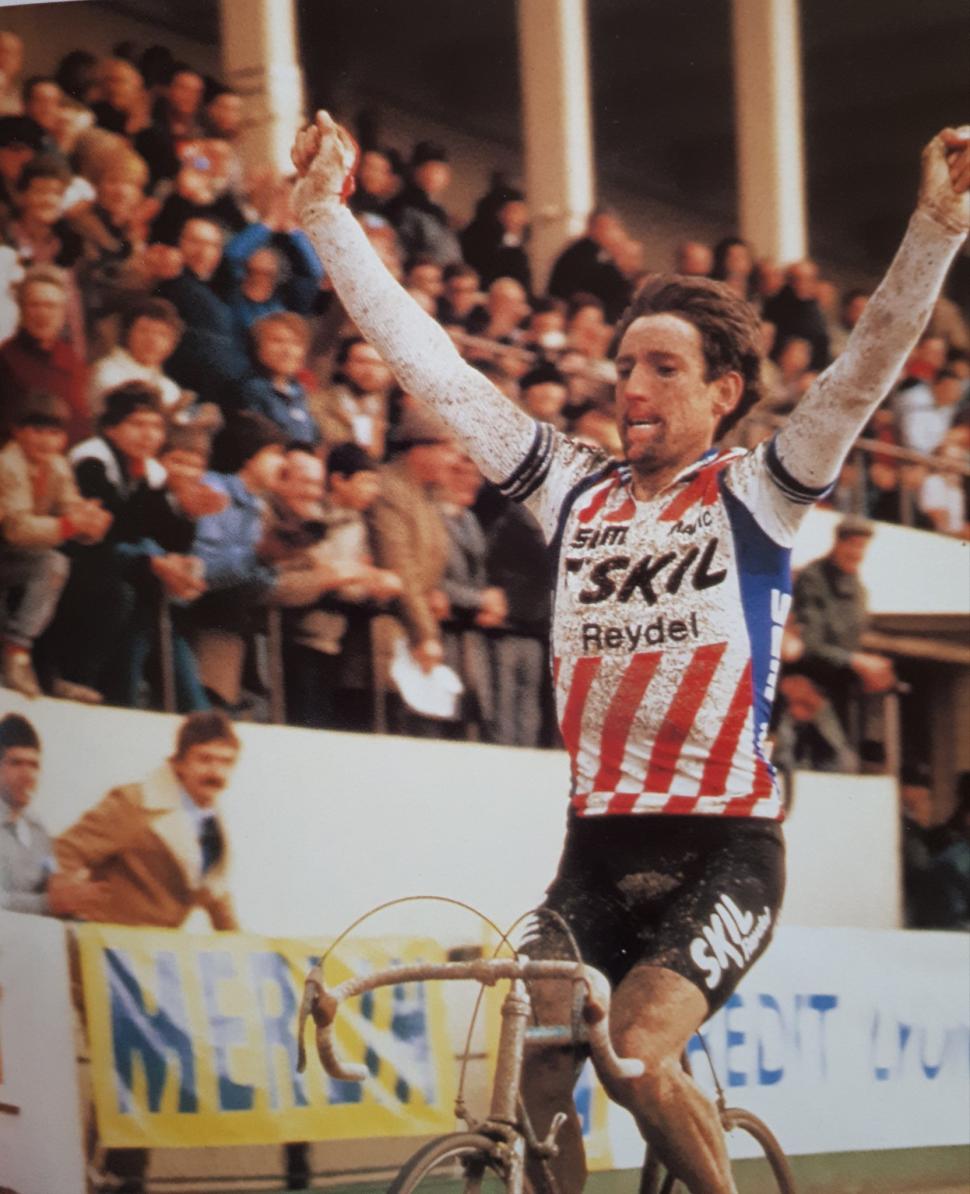
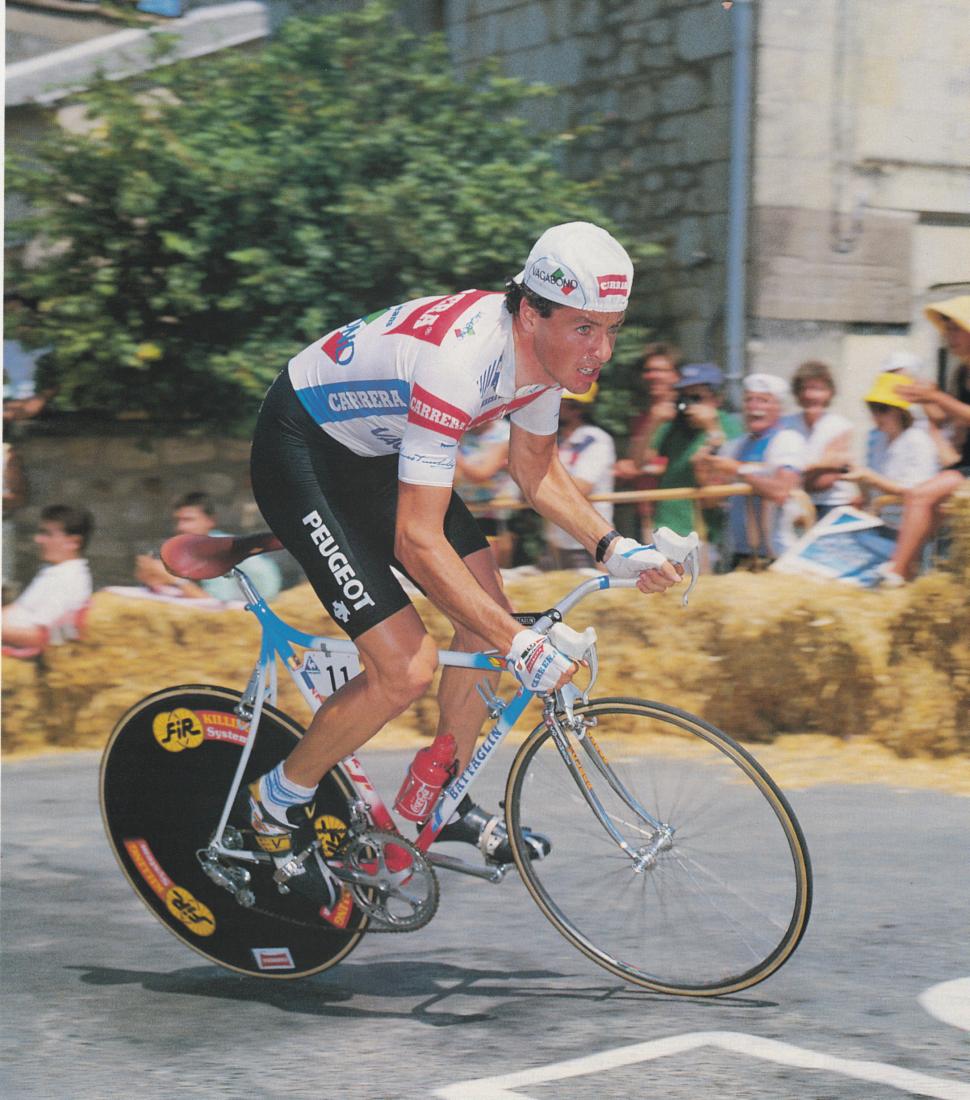
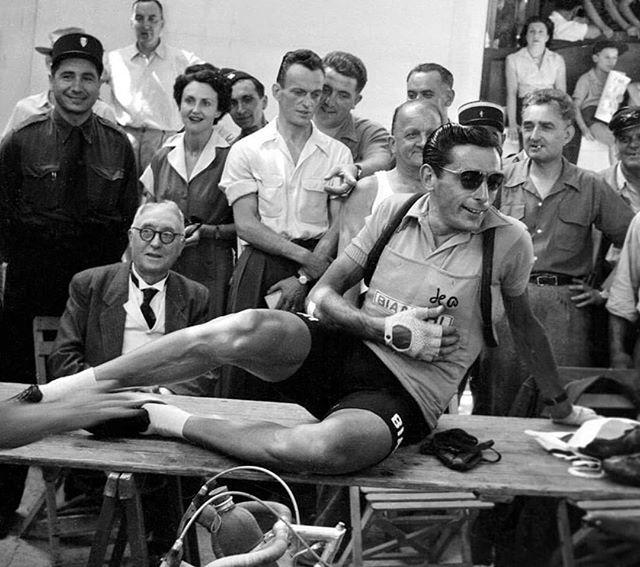

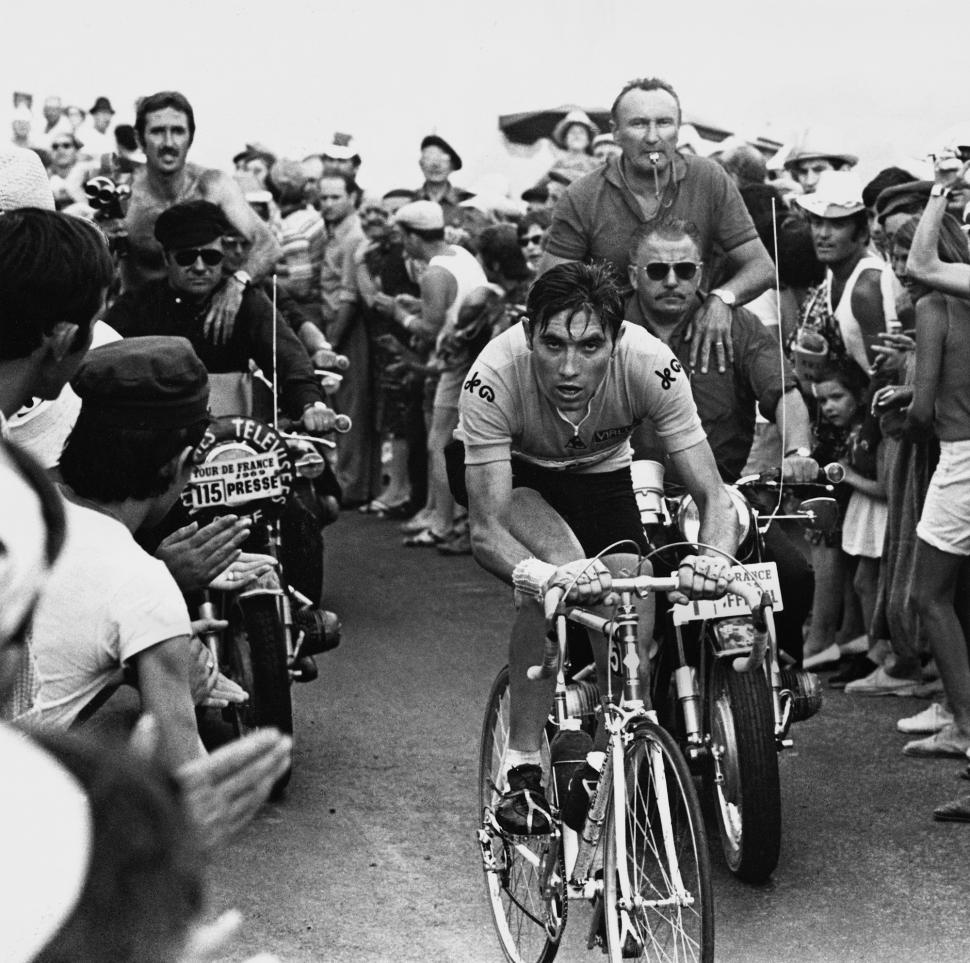
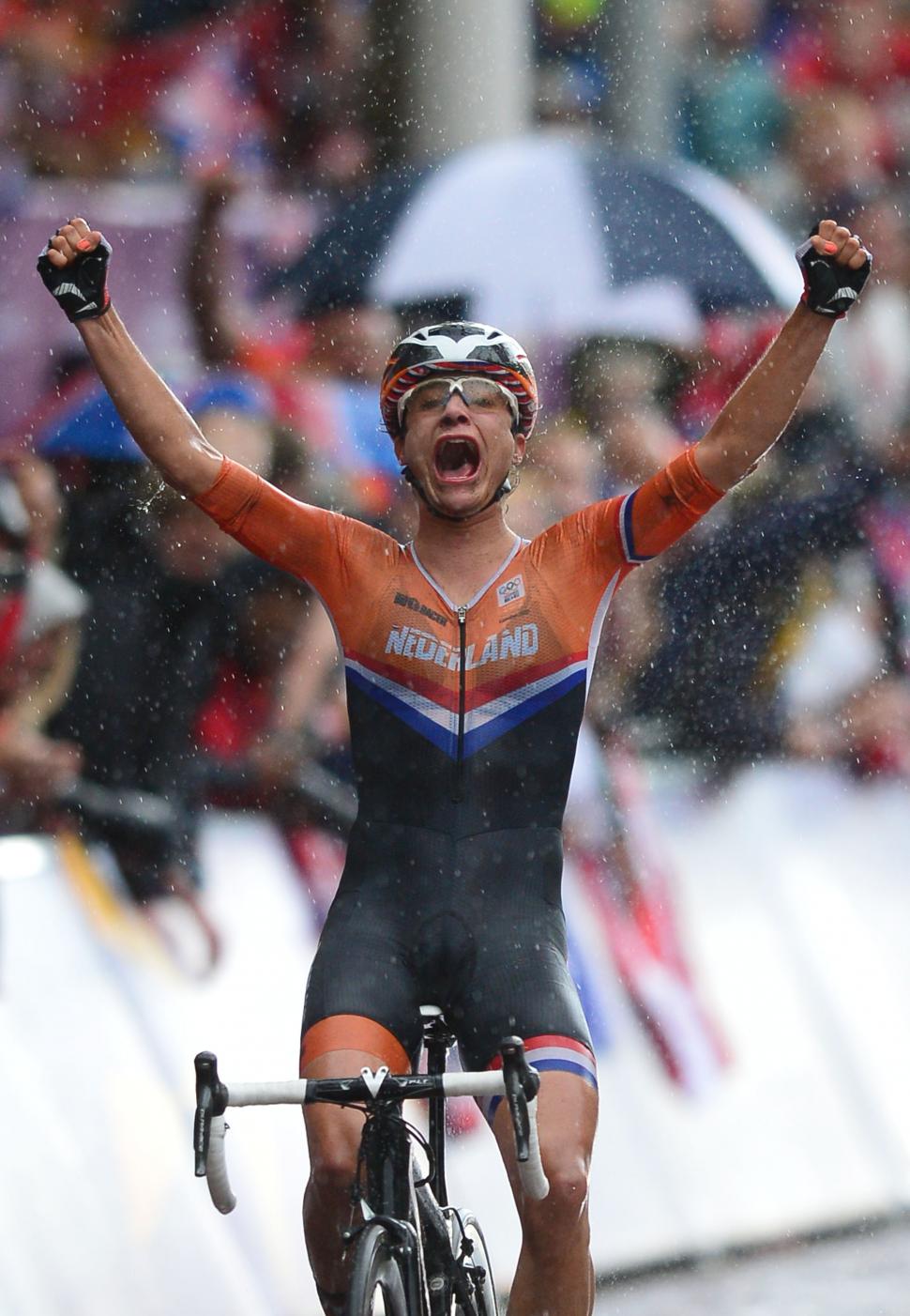
Add new comment
5 comments
Not mentioned, unsurprisingly, would be MvdP In 2019; won CX World Cups, CX World championship, World Tour road races, XCC/XCO World Cups, plus European XCO Championship....
Honourable mention to Froome for winning all three Grand Tour GC titles in a calendar year (Jul '17 - May '18), albeit not a calendar season. In so doing only the fifth rider to win three consecutive TdF titles and the only winner of the TdF/ Vuelta double since the Vuelta was moved to Aug/Sep.
Eddy Merckx 1972, fifty wins, Marianne Vos 2012 sixteen wins. Obviously Vos entered far fewer races than Merckx and that's got a lot to do with lack of opportunity, but that stat alone makes me think maybe positions one and two should be reversed.
well its not a Top Trumps contest, if it was purely on wins there would probably be few women in the list at all, its probably why theyve gone for "best season" to give a more rounded context to it.
and IMO being a multi discipline cycling world champion, and Olympic champion in the same year as well as winning one of the harder multistage races in the womens calendar does rank above a tour/giro double & hour record however many other races were one by Eddy that year.
Because we know full well if van Aert or van der Poel were crowned world cyclocross champion, world road race champion and Olympic champion in the same year even if they won no other races, theyd be lauded as the best cyclists the world had ever seen, bar none. Marianne does the same and we end up quibbling over how many races she should have won instead in the same year.
as for the rest fwiw Id have excluded Jeannie Longo from the list, that failed test IMO clouds the rest of the achievements that year.
plus Id have ranked Beryl B higher than 12th, she didnt just set a 12hr time trial record (actually she stopped riding at 11hrs59mins15secs meaning she could have gone even further) that beat the existing mens record and the new record Mike McNamara set that day, to be not just a record holder but outright winner, she broke it by so much that womens record stood for 50 years. She was the only woman in cycling history, and possibly all endurance sport, to hold a record outright like that at the time, and in the next 20 years only 30men surpassed that distance mark. Plus she had a clean sweep of national titles and a world championship as part of her many accomplishments that year
and wheres Nicole Cooke 2008 ? the first cyclist, man or woman, to be crowned both World and Olympic road race champion in the same year, plus she won her 9th national title, she set the bar that only Marianne has since matched/bettered.
Not by me they wouldn't, that'd still be three single-day races, for me that wouldn't come close to two grand tours and three monuments plus arguably the most prestigious non-GT stage race as well.
As I intimated, it's a fairly pointless comparison between seasons unless there were equal competitive opportunities, but if you are going to make the comparison then three single day races and a nine-day tour under 1000km can't compare with two three-week grand tours over 3500 km+ in my book.